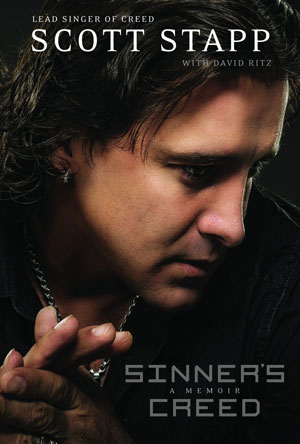 The fall should have killed him. Heavily intoxicated, Scott Stapp slipped from the railing of his hotel balcony and landed on a cement platform 20 feet below, fracturing his skull and breaking several bones.
The fall should have killed him. Heavily intoxicated, Scott Stapp slipped from the railing of his hotel balcony and landed on a cement platform 20 feet below, fracturing his skull and breaking several bones.
This event could have been a tragedy, but instead it was a turning point.
“Looking back, I now know I was face-to-face with what I had become,” he says. For years, Scott, lead singer of the multiplatinum band Creed, had been living the rock-star lifestyle. Addictions plagued him, and depression nearly crippled him. But as Scott recounts in his new memoir, Sinner's Creed, God had bigger plans.
A World of Fear
Sinner's Creed is a rock 'n' roll story, wrapped up in the story of Scott's walk with Christ. His mother and grandparents were Christians, and church was always a part of his life. But it was his stepfather, Steven, who had the most significant impact on his faith.
Having been abandoned by his biological father, Scott yearned for a dad to look after him and his two sisters. When Steven entered their lives, he saw his new father as an answer to prayer. Steven took a keen interest in Scott's life, and the pair bonded over their love of sports and God. But after his mother and Steven were married, everything changed.
Steven was a fierce disciplinarian, equating his rules with the law of God, and beatings became a regular part of Scott's life.
“In a moment, I entered a world of fear,” Scott writes. “Before Steve, I'd gone to God for comfort. God was never angry. Now Steve was saying that when he was angry, God was angry.”
Even as Scott excelled at sports and school, and tried to live a Christian life, nothing was ever good enough.
Sin's Prisoner
By the time Scott arrived at Florida State University (FSU) in the mid-'90s, he no longer knew who God was. “My notion of a loving heavenly Father had been smashed by an abusive earthly father,” he writes.
Creed, which formed at FSU in 1995, was an outlet for the conflict in Scott's soul: “When I discovered that I could express my struggles, frustrations and conversations with God through song, I found my form.”
It's no surprise, then, that Christian imagery and themes are prominent in most of Creed's songs. In My Own Prison, the band's first hit single, Scott sings, “I cry out to God/Seeking only His decision/Gabriel stands and confirms/I've created my own prison.”
My Own Prison and Human Clay, Creed's first two albums, were smash hits, making Scott a megastar—an achievement he was desperate to hold on to, no matter the cost.
“I wanted the party, the glory, the money, the power, the fame,” Scott writes. “I was willing to do anything. Even if it meant risking my life. Failure was not an option.”
By the time Creed's third album, Weathered, came out in 2001, Scott was “rusted and weathered/Barely holdin' together,” as he sings in the album's title track. His addictions were overwhelming him and his friendship with his bandmates was in tatters. When the Weathered tour was over, so was the band.
“Scott Lets God”
The story of Scott's journey out of the darkness that nearly engulfed him after Creed broke up is full of ups and downs.
“My recovery was, is and always will be ongoing,” he writes. “It will never be a sudden and permanent transformation. It's something I'm always going to have to work on and stay committed to. It's a reprieve that comes daily, based on spiritual maintenance.”
Recovery isn't something he's done alone, however. It's based on three principles: “1. Scott can't. 2. God can. 3. Scott lets God.”
As a memoir, Sinner's Creed is a riveting read. For fans, it offers a backstage pass to one of the best rock bands of the era, and a fascinating behind-the-scenes look at Scott's songwriting process. But it's also a story that will resonate with anyone who has struggled with the paradoxes of life and faith.
The book is titled Sinner's Creed, but Scott shows that sin is not the end of the story. “I believe with all my heart that the living Christ, whom I love deeply, stays steady,” he writes. “He is there whenever we call Him.”









Leave a Comment